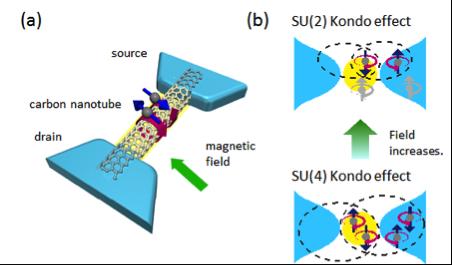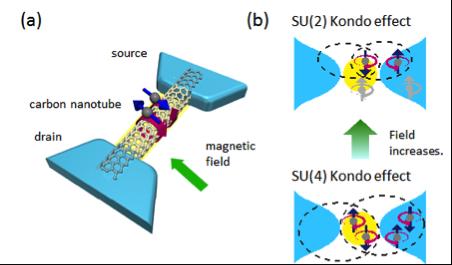
Credit: Osaka University
Osaka, Japan – We encounter phase transitions in our everyday lives when we witness water freezing or boiling. Similarly, quantum systems at a temperature of absolute zero also experience phase transitions. The pressure or magnetic field applied to such systems can be adjusted so that these systems arrive at a tipping point between two phases. At this point quantum fluctuations, rather than temperature fluctuations, drive these transitions.
Many fascinating phenomena with promising technological applications in areas such as superconductivity are linked to quantum phase transitions, but the role of quantum fluctuations in such transitions remains unclear. While there have been many advances in understanding the behavior of individual particles such as protons, neutrons, and photons, the challenge of understanding systems containing many particles that strongly interact with one another has yet to be solved.
Now, an international research team led by a group at Osaka University has discovered a clear link between quantum fluctuations and the effective charge of current-carrying particles. This discovery will help researchers uncover how quantum fluctuations govern systems in which many particles interact. One example of such a system is the interaction of electrons at extremely low temperatures. While low temperatures normally cause the resistance in a metal to drop, the resistance rises again at extremely low temperatures due to small magnetic impurities–this is referred to as the Kondo effect.
"We used a magnetic field to tune the Kondo state in a carbon nanotube, ensuring that the quantum fluctuations were the only variable in the system," study coauthor Kensuke Kobayashi says. "By directly monitoring the conductance and shot noise of the carbon nanotube, we were able to demonstrate a continuous crossover between Kondo states with different symmetries."
Using this novel approach, the researchers discovered a link between quantum fluctuations and the effective charge of current-carrying particles, e*. The discovery means that measurements of e* can be used to quantify quantum fluctuations.
"This is very exciting, as it paves the way for future investigations into the exact role of quantum fluctuations in quantum phase transitions," explains Professor Kobayashi. Understanding quantum phase transitions has the potential to enable many interesting applications in areas such as superconductivity, Mott insulators, and the fractional quantum Hall effect.
###
Media Contact
Saori Obayashi
[email protected]
81-661-055-886
@osaka_univ_e
http://www.osaka-u.ac.jp/en
############
Story Source: Materials provided by Scienmag





